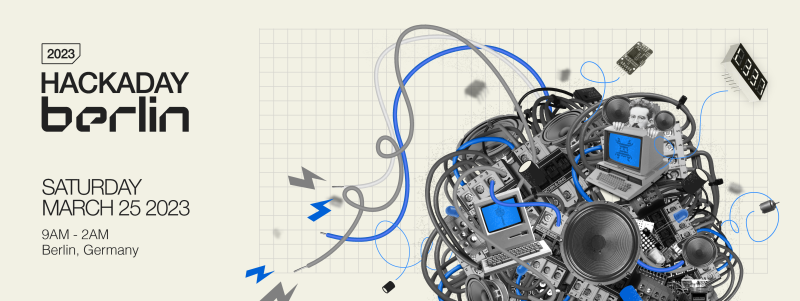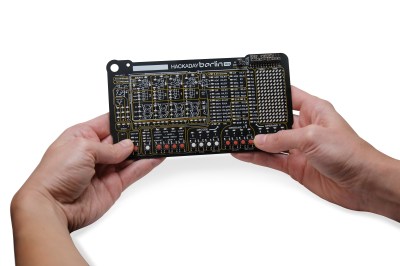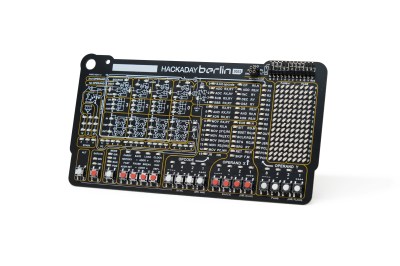

Hackaday Berlin is just under two weeks away, and we’ve got news times three! If you don’t already have tickets, there are still a few left, so grab them while they’re hot. We’ll be rolling out the final full schedule soon, but definitely plan on attending a pre-party Friday night the 24th, followed by a solid 14-hour day of hacking, talks, and music on Saturday the 25th, and then a mellow Bring-a-Hack brunch with impromptu demos, workshops, and whatever else on Sunday from 10:30 until 14:00.
The Badge Round Two
Many Europeans weren’t able to make the flight to Supercon, so here’s your chance to get hands on Voja Antonic’s superb down-to-the-metal computer trainer-slash-retrocomputer on this side of the Atlantic. It’s been re-skinned for Berlin, with a couple hardware tweaks because nobody can leave a board revision alone, but it’s 100% compatible with the badge that took Supercon 2022 by storm.
If you want to read more about it, you should. We loved it, and so did the crowd. One of the coolest badge hardware hacks was a “punchcard” reader, but there was also a lot of work on the software side as well, and we got pull requests for most of the cool demos. If you’re coming, and if you’d like to start your badge hacking a bit early, you could start your research now.
We’ll have a Badge Hacking Ceremony Saturday night, so you can show off whatever you made. It’s lots of fun.
Workshops
We’ve got three formal workshops planned for Hackaday Berlin! You’ll find that we’ve added workshop signups on the ticket sales page. Of course, you need to be coming to attend.
Because space for each is very limited, we request that you pick your favorite and sign up for only one. If you really want to get in and it’s sold out, send an e-mail to prize@hackaday.com and we’ll put you on the wait list.
-
Paul Beech // Hug-O-Rama: Robot Popularity Contest
Given craft materials, motors, servos and Pico microcontrollers, you will be guided in making a robot companion with one redeeming personality trait. We will then battle these neocytes head-to-head as your fellow workshoppers vote on their superficial charm. The winner gets to question those years they spent being really good at something else.
Paul combats his social anxiety and imposter syndrome by mentioning he designed the Raspberry Pi logo. This workshop is presented by Digi-Key.
This workshop runs three hours and costs $20.
-
Matt Venn // Tiny Tapeout – design your own chip and get it made!
In this workshop, you will get the opportunity to design and have manufactured your own design on an ASIC! You will learn: The basics of digital logic, the basics of how semiconductors are designed and made, how to use an online digital design tool to build and simulate a simple design, and how to create the GDS files for manufacture on the open source Sky130 PDK. Participants will have the option to submit their designs to be manufactured on the next shuttle as part of the Tiny Tapeout project. Participants will need a laptop with internet connection. Mouse and headphones advised.
Matt Venn is a science & technology communicator and electronic engineer. He brings 20 years of engineering experience to create innovative learning experiences for people all over the world. Most recently he has been focusing on the world of open source silicon.
This workshop runs two hours and costs $20.
-
Radomir [deshipu] Dopieralski // Fluffbug: A DIY Desktop Robot
A small, cheap, desktop robot like Fluffbug provides ample opportunity for experimenting, while not being too much of a burden. CircuitPython makes it simple to program and it’s easy to add sensors or other hardware to it. It can be controlled with your phone over WiFi, but if you bring your laptop and an USB-C cable, you can also program it yourself.
A Python programmer by day, by night turns into a supervillain constructing insectoid robots, handheld game consoles, custom keyboards and other projects. He sometimes haunts the Swiss Mechatronic Art Society and tries to convert everyone to using CircuitPython.
This workshop runs two hours and costs $40, due mostly to the number of servos involved.
Lightning Talks
A lightning talk is seven minutes long, and it’s your chance to shine as bright as possible in that timeframe. (It’s not easy to give a super short talk – practice it with a clock once or twice.) The idea is to allow the broadest range of the Hackaday community to get up and show off what you’re doing, what’s most interesting to you right now, or anything else that you think we’ll love too.
We had originally planned on keeping the Lightning Talks open until the last minute, but a lot of people wanted to be sure they had a slot before preparing. If you’d like to reserve yourself a slot, fill in this form. If we have space, we’ll take walk-ins, but if you want to guarantee your slot, sign up now.



